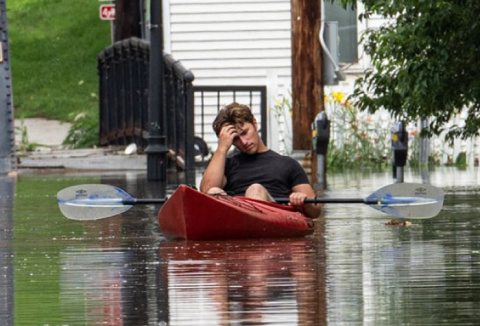In the wake of a natural disaster, most people’s primary concern is making sure that everyone is safe and sound. Few events are as disruptive to normal life as Nature wreaking havoc on your area, and the top priority should be ensuring that you and your loved ones are safe. Once the chaos starts to subside, however, it is vital to stay vigilant about your finances and information. It is an unfortunate part of life after a natural disaster that fraudsters and scammers will do their best to prey on disaster victims’ newfound vulnerability. Fortunately, by knowing what to look for and what to be suspicious of, it is possible to avoid being scammed.
COMMON DISASTER RELIEF SCAMS
Imposter Scams: After a major natural disaster, there is a seemingly endless list of organizations that get involved. Private organizations, nonprofits, and governmental organizations can all be involved, and can range in size from small, local operations to nationwide or federal institutions. It’s a complicated, confusing web, and the perfect opportunity for fraudsters to take advantage of that confusion. By posing as a real–or fake–organization involved in the relief efforts, fraudsters can offer the promise of aid to unsuspecting victims of the disaster. The fraudsters hope that, in the confusion, their targets will not catch on to the fact that they are not who they say they are, and that these individuals might give up personal information or even send the fraudster money for relief efforts. One of the most common methods for obtaining money and information from the target is through an application for relief aid that has an application fee associated with it, which lets the fraudster kill two birds with one stone and receive both money and information.
Charity Scams: The outpouring of support often seen in the wake of a natural disaster can be heartwarming, but to a fraudster, this presents a tremendous opportunity. By posing as a flood relief charity or setting up a fraudulent GoFundMe, fraudsters can trick unsuspecting charitable people into donating money to fraudulent causes.
Contractor Scams: Scammers who claim to be able to provide services in cleanup and repair efforts may present themselves as local contractors in the aftermath of a natural disaster. By asking for payment up front and/or performing poor workmanship, fraudulent contractors can make a significant amount of money off of disaster victims.
Donation Scams: Some fraudsters will approach impacted individuals or businesses and provide an unsolicited donation to aid in repairs. These often come as fraudulent checks. After the target deposits the check (but before the check has been validated), the fraudster will ask for a portion of the value back. If the target gives back this money, they are on the hook for it, as the check will bounce shortly thereafter.
HOW TO AVOID BECOMING A VICTIM
Verify: When dealing with any entity during relief efforts, be sure to verify the following:
- Does the entity exist? Many scammers make up a fraudulent charity, business, or governmental organization as a part of their scam. Make sure to do some quick searching to see if the charity is real or the contractor has a verifiable business, such as checking their license and registration, etc.
- Is this the right contact information? Other fraudsters might pose as a real organization. Make sure that the email address, phone number, or other communication method is the correct one for the entity in question.
- Is the entity involved in relief efforts? If you are in contact with a governmental agency, try checking their website, checking news sources, or otherwise verifying that they are involved in relief efforts.
- Is there a sense of urgency? Many fraudsters try to spur their targets to act quickly to give them less time and space to think critically about the situation. If the entity you are talking to is urging you through a “limited time offer” or anything similar, it is worth being extra suspicious.
- Are they asking for money? Whether through upfront payment, application fees, or the return of a portion of their donation, fraudsters often ask for money with false promises in return. Be suspicious of anybody that is asking for funds.
- What have your neighbors heard? Keeping in touch with your community is an important part of staying safe in the wake of a natural disaster for a wide variety of reasons, and talking with your neighbors and friends is a valuable way to stay informed about what relief efforts are legitimate and which are not.
REBUILDING
It’s important to keep in mind that even though there are fraudsters and scammers who take advantage of natural disasters, there are still many legitimate resources available to help those affected.
If you suspect that you have been targeted by a scam, you can report it to the Vermont Attorney General’s Consumer Assistance Program either by calling
800-649-2424 or visiting ago.vermont.gov/cap. You can also report scams to the Federal Trade Commission by visiting ftc.gov/complaint or to the Better Business Bureau at bbb.org/scamtracker. Additionally, the Vermont Emergency Management website provides the latest information on disaster relief efforts and resources for those impacted by natural disasters.
By reporting scams and staying informed, you can help protect yourself and others from falling victim to fraud during tough times. It’s always better to err on the side of caution.
Author Sam Reed is a fraud specialist at VSECU, helping keep members and their money safe and secure. He lives in Waterbury, and spends his hours outside of work making music and enjoying the outdoors in whatever fashion the season allows.

